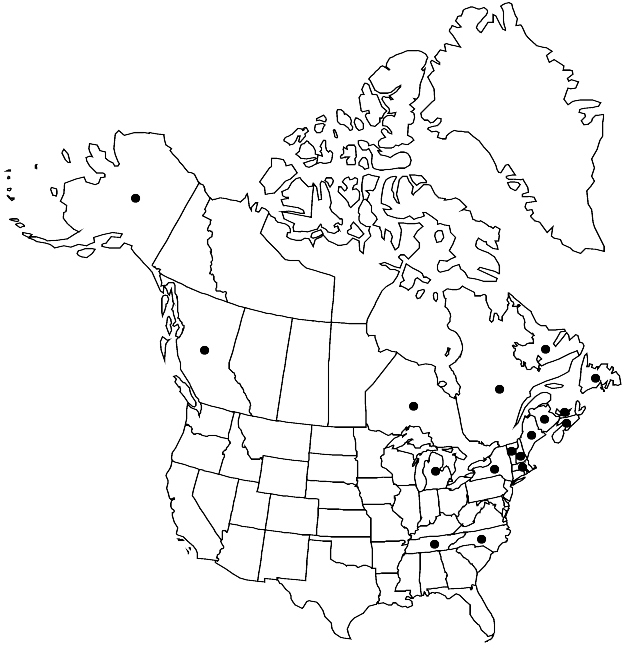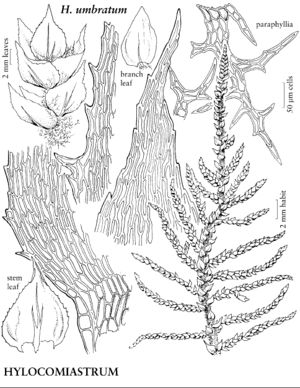Difference between revisions of "Hylocomiastrum umbratum"
in H. G. A. Engler et al., Nat. Pflanzenfam. ed. 2, 11: 487. 1925.
FNA>Volume Importer |
FNA>Volume Importer |
||
| Line 32: | Line 32: | ||
|elevation=low to high elevations (0-2000 m) | |elevation=low to high elevations (0-2000 m) | ||
|distribution=B.C.;N.B.;Nfld. and Labr.;N.S.;Ont.;P.E.I.;Que.;Alaska;Maine;Mass.;Mich.;N.H.;N.Y.;N.C.;Tenn.;Vt.;Eurasia;Africa. | |distribution=B.C.;N.B.;Nfld. and Labr.;N.S.;Ont.;P.E.I.;Que.;Alaska;Maine;Mass.;Mich.;N.H.;N.Y.;N.C.;Tenn.;Vt.;Eurasia;Africa. | ||
| − | |discussion=<p>In addition to the numerous highly branched paraphyllia, stems in Hylocomiastrum umbratum (but not H. pyrenaicum) also bear some scattered larger paraphyllia. These are more than twice the size of typical paraphyllia, are lanceolate-subulate with toothed margins, and closely resemble the foliose pseudoparaphyllia. Under a dissecting microscope these larger paraphyllia are clearly visible at 30× scattered among the shorter paraphyllia. In otherwise difficult specimens, the presence of these larger foliose paraphyllia can be used to distinguish H. umbratum from H. pyrenaicum.</p> | + | |discussion=<p>In addition to the numerous highly branched paraphyllia, stems in <i>Hylocomiastrum umbratum</i> (but not <i>H. pyrenaicum</i>) also bear some scattered larger paraphyllia. These are more than twice the size of typical paraphyllia, are lanceolate-subulate with toothed margins, and closely resemble the foliose pseudoparaphyllia. Under a dissecting microscope these larger paraphyllia are clearly visible at 30× scattered among the shorter paraphyllia. In otherwise difficult specimens, the presence of these larger foliose paraphyllia can be used to distinguish <i>H. umbratum</i> from <i>H. pyrenaicum</i>.</p> |
|tables= | |tables= | ||
|references= | |references= | ||
| Line 55: | Line 55: | ||
|publication year=1925 | |publication year=1925 | ||
|special status=Selected by author to be illustrated | |special status=Selected by author to be illustrated | ||
| − | |source xml=https://jpend@bitbucket.org/aafc-mbb/fna-data-curation.git/src/ | + | |source xml=https://jpend@bitbucket.org/aafc-mbb/fna-data-curation.git/src/8f726806613d60c220dc4493de13607dd3150896/coarse_grained_fna_xml/V28/V28_509.xml |
|genus=Hylocomiastrum | |genus=Hylocomiastrum | ||
|species=Hylocomiastrum umbratum | |species=Hylocomiastrum umbratum | ||
Revision as of 18:06, 18 September 2019
Plants to 15 cm, wiry. Stems 1–2 mm wide across leafy stem, irregularly to regularly 1–2(–3)-pinnate, often somewhat frondose or bushy, branches slender, innovations arching. Stem leaves erect- to wide-spreading, distant, broadly ovate to deltoid, slightly concave, 0.8–2(–2.5) × 0.8–1.5 mm; margins serrulate basally, spinose-serrate distally; apex gradually narrowed; costa usually double, sometimes single, single and 2-fid, or triple; medial laminal cells 30–65 × 4–7 µm. Branch leaves loosely imbricate, ovate, 0.4–1.2 × 0.3–0.8 mm; costa often single, but variable. Seta 2–4.5 cm. Capsule ovoid-ellipsoid, 1.5–2.5 mm.
Habitat: Soil, humus, old logs, and rock in moist forests, especially under spruce and fir
Elevation: low to high elevations (0-2000 m)
Distribution

B.C., N.B., Nfld. and Labr., N.S., Ont., P.E.I., Que., Alaska, Maine, Mass., Mich., N.H., N.Y., N.C., Tenn., Vt., Eurasia, Africa.
Discussion
In addition to the numerous highly branched paraphyllia, stems in Hylocomiastrum umbratum (but not H. pyrenaicum) also bear some scattered larger paraphyllia. These are more than twice the size of typical paraphyllia, are lanceolate-subulate with toothed margins, and closely resemble the foliose pseudoparaphyllia. Under a dissecting microscope these larger paraphyllia are clearly visible at 30× scattered among the shorter paraphyllia. In otherwise difficult specimens, the presence of these larger foliose paraphyllia can be used to distinguish H. umbratum from H. pyrenaicum.
Selected References
None.
